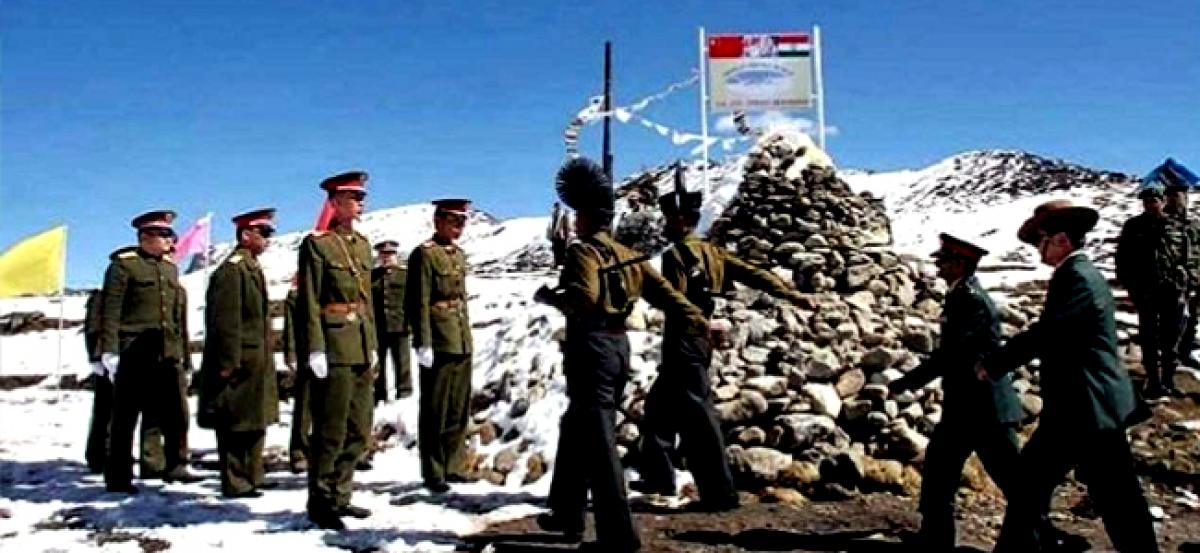Live
- Unselfishness is a Lie
- ICTPL welcomes maiden vessel MV KSL Fuyang
- BJP leaders mock Rahul's speech
- Analysing Happiness
- Two-day ToT organised for trainers
- Savarkar preferred Manusmriti to Constitution: Rahul
- Daily Horoscope for 15 December 2024: Embrace Today’s Insights of Your Zodiac Sign and Unlock Your Potential.
- Beyond The Flames
- CM warns officials of stringent action
- NDA alliance candidates win all seats
Just In

Bilateral ties between India and China can\'t take the strain of another Doklam episode, Chinese envoy to India Luo Zhaohui said on Monday, emphasising the need to find a \"mutually acceptable solution\" on the boundary issue through a meeting of Special Representatives.
Bilateral ties between India and China can't take the strain of another Doklam episode, Chinese envoy to India Luo Zhaohui said on Monday, emphasising the need to find a "mutually acceptable solution" on the boundary issue through a meeting of Special Representatives.
The Chinese envoy said "some Indian friends" had suggested trilateral cooperation comprising India, China and Pakistan under the aegis of the Shanghai Cooperation Organisation (SCO), which was a "very constructive" idea.
"Security cooperation is one of the three pillars of the SCO. Some Indian friends suggested that China, India and Pakistan may have some kind of trilateral cooperation under the SCO," he said in his keynote address on 'Beyond Wuhan: How Far and Fast can China-India Relations Go' at an event organised by the Chinese Embassy here.
Responding to a question on whether a trilateral between the Asian neighbours will help in solving the India-Pakistan dispute, he said he personally considers it "a good and constructive idea".
"Maybe not now, but in the future, that is the great idea. It will help to resolve bilateral issues and help to maintain peace and tranquillity," he said.
Dwelling on Sino-Indian ties, the envoy said it is quite natural to have differences with neighbours but they need to be controlled and managed through cooperation.
"We need to narrow differences through expanding cooperation. However, it does not mean that differences would be ignored. The boundary question between our two countries was left over by history. We need to build on convergence to find a mutual acceptable solution through the Special Representatives Meeting while adopting confidence building measures to maintain the peace and tranquillity along the border," he said.
"We cannot stand another Doklam (sic)," the envoy said.
Indian and Chinese troops were involved in a 73-day stand-off at the Doklam tri-junction of India, Bhutan and China between June to August last year.
Luo also suggested that India and China should think about signing a Treaty of Friendship and Cooperation. He said a draft on this was provided to the Indian side about 10 years ago.
One of the immediate fallouts of the Doklam stand-off was the suspension of the Kailash Mansarovar Yatra from Nathu-La side and the annual military exercise between the two countries. China also did not give the hydrological data of the Brahmaputra and the Indus river that originates in Chinese Tibet.
The envoy today said China will continue to promote religious exchanges and make arrangements for Indian pilgrims going to Kailash Mansarovar in Tibet.
Post-Doklam, there have been frequent high-level engagements between the leaders of the two countries.
Luo said Prime Minister Narendra Modi and Chinese President Xi Jinping, who met twice in the last two months in Wuhan and Qingdao, are also likely to meet on the sidelines of the BRICS Summit and G20 Summit later this year.
The Chinese defence minister and the minister for public security will visit India and the Special Representative Meeting on boundary issue will be held in Beijing this year, he added.
Relations between India and China have gone beyond the bilateral scope, Luo stressed.
"We need to enhance coordination and cooperation in SCO, BRICS and join hands to tackle social challenges," he said.
Responding to a question on India-China cooperation in Afghanistan, Luo said the two countries have identified a programme to train Afghan public servants and diplomats.
"This is a first step and in future, there is more...," he said.
In the informal summit between Modi and Xi at the Wuhan, the two countries had agreed to work jointly on an economic project in Afghanistan.
The envoy also called for cooperation between India and China to coordinate each other's positions on issues like rising protectionism globally.
"Against the backdrop of anti-globalisation and rising protectionism, China and India, as major emerging market economies, are faced with the pressure of established powers. We should coordinate our positions and also explore ways to be with each other," the envoy said without naming the US.
The US has slapped high tariffs on certain steel and aluminum products, which has led to a trade-war kind of a situation as other nations too are raising their tariff walls.
He said China will import more sugar, non-Basmati rice and high quality medicines from India to reduce trade imbalance.
In 2017-18, the trade-deficit (difference between imports and exports) between India and China stood at USD 63 billion.
"We (China) would also like to negotiate a regional trade arrangement with India to expand trade relations," he added.

© 2024 Hyderabad Media House Limited/The Hans India. All rights reserved. Powered by hocalwire.com







